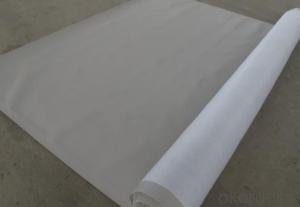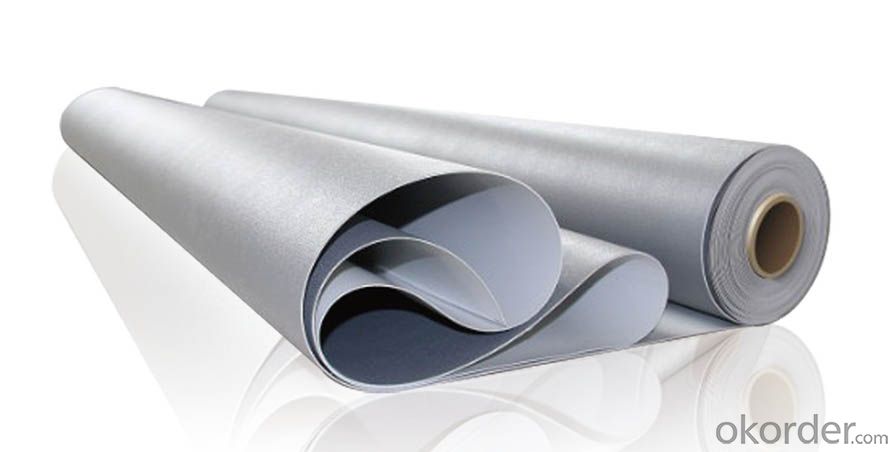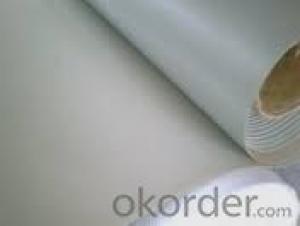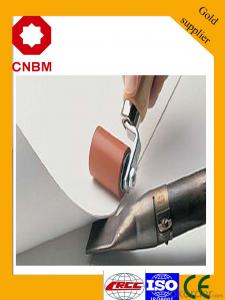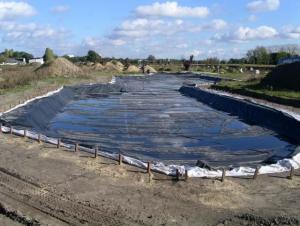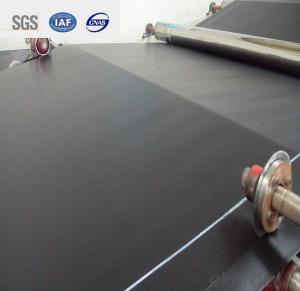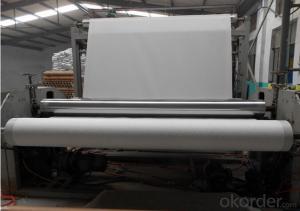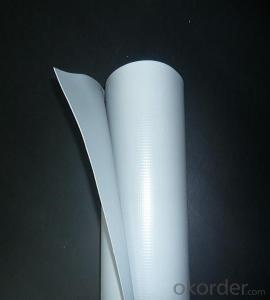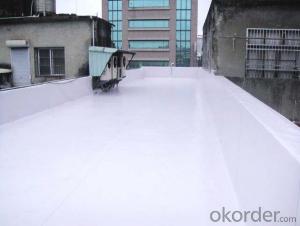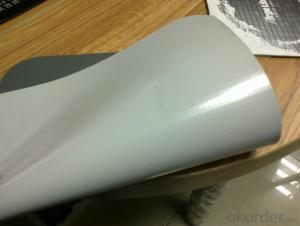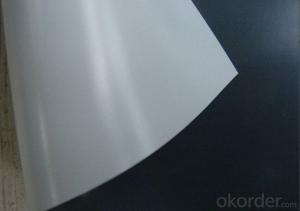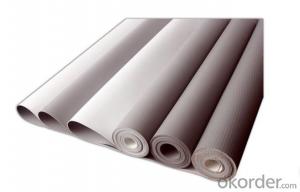Polyvinyl Chloride (PVC) Waterproofing Membrane
- Loading Port:
- China main port
- Payment Terms:
- TT OR LC
- Min Order Qty:
- 5000 m²
- Supply Capability:
- 100000 m²/month
OKorder Service Pledge
OKorder Financial Service
You Might Also Like
1. Introduction of PVC Waterproofing Membrane
Polyvinyl Chloride (PVC) waterproof membrane is a new polymer waterproof membrane which is made from polyvinyl chloride resin, and mixed with plasticizer, filler, antioxygen, ultraviolet absorber and other auxiliaries.
2. Features of PVC Waterproofing Membrane
1) Excellent aging resistance. Service life of roofing material is over 20 years;
service life of underground material is over 50 years.
2) Root resistant penetration, specially used on planting roof.
3) Welding installation. Joints are solid and environment friendly, no pollution.
4) High tensile strength, good elongation and dimensional stability.
5) Good plasticity, easy and suitable for details installation.
6) Fireproof. Fire extinguished out of the ignition resource.
7) Surface is smooth, no fading and dirty resistant.
3. Specification of PVC Waterproofing Membrane
Length | 20m/roll or customized |
Width | 2.05m |
Thickness | 1.2mm; 1.5mm; 2.0mm |
Type | Homogeneous, Reinforced, Fabric back |
If Exposed | Exposed and Non-exposed |
Color | White, Grey or customized |
4. Applications of PVC Waterproofing Membrane
1) All kinds of roofs, such as steel structure roof, planted roof etc.
2) Underground engineering, such as building basement, subways, tunnels, air raid shelter, etc.
3) Other projects like artificial lake, dam, water reservoir, grain storehouse, etc.
5. FAQ of PVC Waterproofing Membrane
a.Can we get some samples before place order?
Answer: We can send the free samples to you by freight collect.
b.How many years can your PVC membrane guarantee?
Answer: We will guarantee the quality for 5 years at least.
c.Which countries you ever export the product?
Answer: We export the PVC membrane to South Africa, Middle east and even European countries.
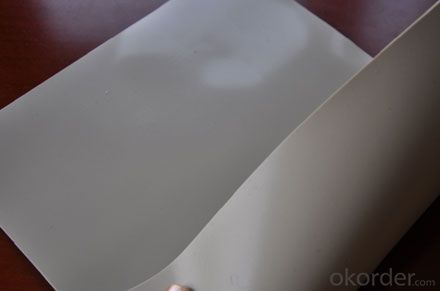
- Q: Can a waterproofing membrane be used on stone block surfaces?
- Yes, a waterproofing membrane can be used on stone block surfaces. The membrane creates a protective barrier that prevents water penetration and helps to maintain the integrity of the stone blocks. However, it is essential to ensure that the appropriate type of waterproofing membrane is selected and installed correctly to ensure proper adhesion and durability on the stone surface.
- Q: Can a waterproofing membrane be used on precast galvanized surfaces?
- Yes, a waterproofing membrane can be used on precast galvanized surfaces. The waterproofing membrane is designed to provide a protective barrier against water penetration, and it can be applied to various surfaces including precast galvanized surfaces. The membrane helps to prevent water from seeping into the surface, protecting the underlying structure from moisture damage. However, it is important to ensure that the precast galvanized surface is properly prepared before applying the membrane, as any loose or flaking galvanized coating should be removed to ensure proper adhesion of the membrane. Additionally, it is advisable to consult with the manufacturer or supplier of the waterproofing membrane to ensure that it is compatible with galvanized surfaces and to follow their recommended application guidelines for best results.
- Q: Can a waterproofing membrane be applied to horizontal surfaces?
- Yes, a waterproofing membrane can be applied to horizontal surfaces. In fact, it is commonly used to protect and waterproof horizontal surfaces such as roofs, decks, balconies, and other flat areas. The membrane acts as a barrier, preventing water from penetrating the surface and causing damage. It is typically made of a flexible material, such as rubber or modified bitumen, which can easily conform to the contours of the horizontal surface. Additionally, the membrane is designed to withstand foot traffic and other loads, ensuring long-lasting protection. Overall, applying a waterproofing membrane to horizontal surfaces is an effective way to prevent water damage and extend the lifespan of the surface.
- Q: Can a waterproofing membrane be used on tunnels with railway systems?
- Tunnels with railway systems can indeed utilize waterproofing membranes. These membranes are widely employed in tunnel construction to prevent water ingress and safeguard the tunnel structure against deterioration. By effectively sealing the tunnel walls, ceilings, and floors, they successfully prevent water from seeping into the tunnel, thereby averting potential damage to the railway system or infrastructure. Specifically designed to withstand the high-pressure conditions and constant vibrations associated with railway operations, these membranes are typically composed of durable materials like PVC, HDPE, or modified bitumen. Such materials not only offer excellent waterproofing properties but also ensure long-term durability. Moreover, these membranes can be effortlessly installed during the tunnel's construction phase or retrofitted onto existing tunnels, causing minimal disruption to railway operations. In essence, the utilization of waterproofing membranes has proven to be a reliable and efficient technique for ensuring the structural integrity and longevity of tunnels with railway systems.
- Q: Can a waterproofing membrane be used in historical or heritage buildings?
- Yes, a waterproofing membrane can be used in historical or heritage buildings. However, it is important to consider the specific requirements and sensitivities of these types of buildings before applying any waterproofing solution. Historical or heritage buildings often have unique architectural features, materials, and construction techniques that need to be preserved and protected. When using a waterproofing membrane in historical or heritage buildings, it is crucial to select a product that is compatible with the existing materials and will not cause any damage or alteration to the structure. It is recommended to consult with a professional architect or preservation expert who has experience working with historical buildings to ensure that the chosen waterproofing membrane is suitable for the specific requirements of the building. Additionally, it is important to consider the aesthetic impact of the waterproofing membrane on the building's appearance. Historical or heritage buildings often have unique architectural details and façades that contribute to their character and value. Therefore, the waterproofing membrane should be chosen carefully to ensure that it does not detract from the building's historical significance or visual appeal. In summary, a waterproofing membrane can be used in historical or heritage buildings, but it should be selected and applied with caution. It is essential to consider the building's materials, construction techniques, and aesthetic value to ensure that the waterproofing solution does not compromise the integrity or historical significance of the structure.
- Q: Where are waterproofing membranes commonly used?
- Waterproofing membranes are commonly used in construction, particularly in areas such as basements, roofs, foundations, and bathrooms, where protection against water infiltration and moisture is crucial.
- Q: Can waterproofing membranes be used on concrete floors?
- Yes, waterproofing membranes can be used on concrete floors. Waterproofing membranes are commonly used in construction to prevent water penetration and protect the underlying structure. When applied to concrete floors, these membranes create a barrier that prevents water from seeping through and causing damage. Waterproofing membranes can be particularly useful in areas such as basements, bathrooms, and outdoor patios where water exposure is common. They help to maintain the integrity of the concrete floor and protect it from moisture-related issues like cracking, spalling, and mold growth.
- Q: Can waterproofing membranes be used on outdoor decks?
- Yes, waterproofing membranes can be used on outdoor decks. They provide an effective barrier against water and moisture, protecting the deck's structure and preventing damage from weather elements. Waterproofing membranes help to extend the lifespan of the deck and maintain its aesthetic appeal.
- Q: Can a waterproofing membrane be used in parking garages?
- Yes, a waterproofing membrane can be used in parking garages. Parking garages are exposed to various weather conditions, including rain and snow, and are often subjected to heavy vehicular traffic, which can lead to moisture infiltration and damage to the structure. Therefore, it is crucial to install a reliable waterproofing system to protect the parking garage against water penetration and potential structural deterioration. A waterproofing membrane is an effective solution for parking garages as it acts as a barrier against water and moisture. It is typically made of materials such as modified bitumen, PVC, or EPDM, which are durable and resistant to water intrusion. The membrane is applied to the surface of the concrete structure, creating a protective layer that prevents water from seeping through. The waterproofing membrane not only safeguards the parking garage against water infiltration but also helps to extend the lifespan of the structure. By preventing moisture from penetrating the concrete, it reduces the risk of corrosion, reinforcing steel deterioration, and the formation of cracks. This ultimately helps to maintain the structural integrity of the parking garage and avoid expensive repairs or replacements in the future. Additionally, a waterproofing membrane can also provide added benefits such as resistance to chemicals, UV radiation, and abrasion. This makes it an ideal solution for parking garages that are exposed to harsh environmental conditions and heavy traffic. In summary, a waterproofing membrane is highly recommended for use in parking garages as it offers reliable protection against water infiltration, helps to maintain the structural integrity of the garage, and extends its lifespan.
- Q: Can a waterproofing membrane be used on plaster surfaces?
- Yes, a waterproofing membrane can be used on plaster surfaces. Plaster is a porous material that can easily absorb water, making it susceptible to damage from moisture. Applying a waterproofing membrane on plaster surfaces helps to create a barrier that prevents water from penetrating the plaster, thus protecting it from moisture-related issues such as mold, mildew, and deterioration. It is important to ensure that the plaster surface is clean, dry, and free from any loose or flaking material before applying the waterproofing membrane. Additionally, proper surface preparation and application techniques should be followed to ensure the effectiveness and longevity of the waterproofing system.
Send your message to us
Polyvinyl Chloride (PVC) Waterproofing Membrane
- Loading Port:
- China main port
- Payment Terms:
- TT OR LC
- Min Order Qty:
- 5000 m²
- Supply Capability:
- 100000 m²/month
OKorder Service Pledge
OKorder Financial Service
Similar products
Hot products
Hot Searches
Related keywords
